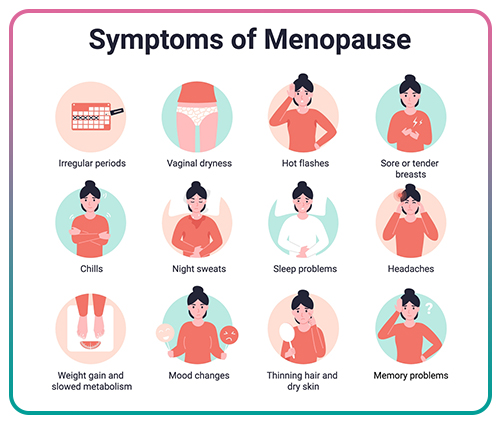Menopause is a natural phase of life, typically occurring in women between the ages of 45 and 55. However, for some women, menopause can begin much earlier—before the age of 40—known as early menopause or premature ovarian insufficiency (POI). Recognizing the signs and symptoms of early menopause is essential for timely diagnosis and management, as it can have significant health and emotional implications.
What is Early Menopause?
Early menopause occurs when the ovaries stop producing eggs earlier than expected, leading to a decline in estrogen levels. This hormonal shift brings about the same changes experienced during natural menopause, but earlier in life. It may happen naturally or be triggered by medical treatments such as chemotherapy, radiation, or surgery involving the ovaries.
Causes of Early Menopause
Several factors can contribute to early menopause, including:
- Genetics: A family history of early menopause can increase the likelihood.
- Autoimmune Disorders: Conditions like thyroid disease or rheumatoid arthritis can impact ovarian function.
- Medical Treatments: Chemotherapy, radiation, or ovary removal surgeries may lead to early menopause.
- Lifestyle Factors: Smoking, stress, and malnutrition may also play a role.
Common Signs and Symptoms
While early menopause shares symptoms with natural menopause, the earlier onset can make these signs unexpected and concerning. Key symptoms include:
- Irregular Periods
One of the earliest signs is a change in menstrual patterns, including skipped periods, shorter or longer cycles, or changes in flow. - Hot Flashes and Night Sweats
Sudden feelings of heat, often accompanied by sweating and flushing, are classic menopausal symptoms and may occur during the day or night. - Vaginal Dryness
Reduced estrogen levels can lead to dryness, discomfort during intercourse, or recurrent urinary tract infections (UTIs). - Mood Swings and Anxiety
Hormonal fluctuations can trigger emotional symptoms such as irritability, depression, or heightened anxiety. - Fatigue
Persistent tiredness, even with adequate sleep, can be a symptom of early menopause. - Reduced Libido
A drop in estrogen can affect sexual desire and arousal, leading to a noticeable decrease in libido. - Sleep Disturbances
Difficulty falling or staying asleep, often linked to night sweats or anxiety, is a common complaint. - Cognitive Changes
Some women report memory lapses, difficulty concentrating, or a general sense of “brain fog.” - Physical Changes
Loss of skin elasticity, thinning hair, and weight gain—particularly around the abdomen—are often associated with hormonal changes. - Bone Density Loss
Reduced estrogen can lead to weaker bones, increasing the risk of osteoporosis and fractures.
How is Early Menopause Diagnosed?
If you suspect early menopause, it’s important to consult a healthcare provider. Diagnosis typically involves:
- Medical History: Discussing symptoms, family history, and lifestyle factors.
- Blood Tests: Checking hormone levels, including follicle-stimulating hormone (FSH) and estrogen.
- Other Tests: Evaluating thyroid function and ruling out other conditions that mimic menopausal symptoms.
Here are some essential tips to Protect Your Ovarian Health.
Managing Early Menopause
Early menopause requires a tailored approach to address both immediate symptoms and long-term health risks, such as osteoporosis and heart disease. Common strategies include:
- Hormone Replacement Therapy (HRT)
HRT can help restore hormonal balance, alleviating symptoms and protecting bone and cardiovascular health. - Lifestyle Adjustments
- Nutrition: A balanced diet rich in calcium and vitamin D supports bone health.
- Exercise: Regular weight-bearing exercises improve bone strength and overall well-being.
- Stress Management: Mindfulness, yoga, and therapy can help manage emotional changes.
- Non-Hormonal Medications
Some women may opt for non-hormonal treatments to address specific symptoms, such as antidepressants for mood swings or lubricants for vaginal dryness. - Support Groups and Counseling
Connecting with others experiencing early menopause can provide emotional support and coping strategies.
Why Early Diagnosis Matters
Early menopause not only affects fertility but also increases the risk of conditions such as osteoporosis, cardiovascular disease, and mental health issues. Early diagnosis allows women to take proactive steps to protect their health and maintain their quality of life.
Final Thoughts
Experiencing early menopause can be a challenging journey, but understanding its signs and symptoms is the first step toward effective management. If you notice changes in your cycle or experience symptoms that may indicate early menopause, seek medical advice promptly.
Your health and well-being are worth prioritizing at every stage of life. Stay informed, seek support, and take steps to navigate this transition with confidence.
Are you experiencing symptoms of early menopause? Contact us today to schedule a consultation with our specialists. We’re here to help you every step of the way.

